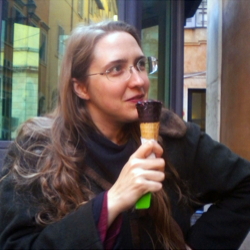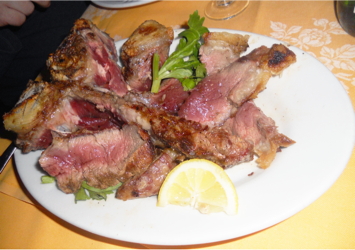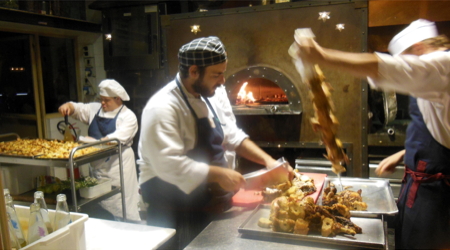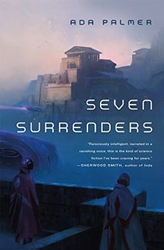
As you know, Bob, the Nebula Awards Conference is happening this week (I fly out on Wednesday), it’s always an exciting time, a chance to reconnect with old friends and to make some new ones. Among the latter is Ada Palmer, this week’s guest here at EATING AUTHORS. I first noticed her name when I received my preliminary programming schedule for the GenCon Writer’s Symposium and saw we were doing a panel together. Then I spotted it again when I was perusing the “Ask An Expert” offerings at the Nebs. And again upon discovering that not only is her debut novel, Too Like the Lightning, coming out tomorrow from Tor Books, but also that we share a publicist. It’s like the universe was speaking to me.
And if that weren’t enough to convince me to invite her in to tell us about her most amazing meal, you need to know that this is a woman who is organizing a four-person team to determine, once and for all, the best possible gelato experience in Florence! Ada is also a history professor at the University of Chicago, and I can only imagine that if any of the people who tried to teach me history had shared even a fraction of her passion for empirical gelato discovery, my education would have gone a very different direction.
Also worth noting is that tomorrow’s debut fiction release is just the first volume in her Terra Ignota series. Book two, Seven Surrenders, comes out the first Tuesday in December (but feel free to pre-order it now).

LMS: Welcome, Ada. Gelato research notwithstanding, what’s your most memorable meal?
AP: My career as a historian, studying wicked popes and Renaissance heretics, gives me the privilege of spending long periods in Rome and Florence, consulting the Vatican and Laurenziana libraries. Thus I spent many of my formative student years—the first years after college cafeterias when I had to feed myself for the first time—in Italy, that magical land where all the blandest store produce is more flavorful than America’s freshest farmers’ markets, and olive oil you would pay $50+ for in the US comes in free disposable squeezy packets like ketchup. Once I leveled up at identifying good gelato by sight, and learned do dodge the many tourist traps, implausibly exquisite meals, both out and in my own kitchen, became the instant norm. My life then acquired a small strategy game of finding different ways (doable on my grad student budget) to make every precious mealtime I had in Italy into a little piece of perfection. I got good at it, too. I remember once helping a pair of very lost tourists scramble to make their Uffizi appointment, and I grabbed quick pizza from O’ Vesuvio for them to eat while standing in line. I apologized that there wasn’t time for a better lunch, and the woman stared as if I’d sprouted a second head: “This is the best pizza bar none I’ve ever had!
To give a quick sample of the food standards I got used to on these Italian sojourns, one Christmas Eve I was wandering through the drizzle at about 5 PM, having just obtained a precious packet of Tuscan Christmas sausages made from pure cured fat (you have to try them!), when I ran across a pair of lost American students desperately in search of supper. They were starving, but no respectable restaurant in Florence opens before 7 PM, so, after chatting a bit and bonding over The West Wing, I promised to take them to a restaurant at 7, but in the meantime that I would get them a snack. I sat them on a bench, and popped into a corner dairy, returning with a ball of mozzarella (Dei Preti brand) in a plastic bag, and a tub of yogurt (Müller brand “yogurt biancoâ€). With my bare hands I mauled the mozzarella bag open and plopped the wet ball in the man’s hand, then ripped off the foil lid of the yogurt, folded it into a crude spoon and handed it to the woman, and there they stood, facing each other, holding cold dairy products in the rain. They stared at me like I was crazy. Fair. They then tasted. There followed a fight which lasted (I timed it) three full minutes, in which each of the pair insisted that the item (s)he was eating was the most sublime achievement of humankind, and each tried to get the other to taste their thing, while staunchly refusing to try the other’s thing, which could only possibly pollute the perfection of this first thing. They eventually negotiated a truce, in which both agreed to trade items and count to three, then taste the other’s item, each declaring confidently that one taste would make the other confess the error of having believed anything could match the deliciousness of the first thing. On three both bit down, moaned with delight, declared the cheese and yogurt equal winners, and we spent a happy half hour eating cold dairy products in the rain. At seven, I took them to Bordino for fresh pasta in truffle cream sauce, and Florence’s famous steak.

I tell this account of my average food experience in Florence to give a sense of how serious a food experience Teatro del Sale has to be to stand out as the instant #1. As a final preface I should say that I love banquets. I love surveying a vista of dishes like a mountain range in front of me. I love sharing, ripping up breads, handing half to friends, biting in together, taking turns to try to describe the unique experience of a dish, and applauding exceptional articulations. Once, after six months of demoralizing illness, I set off to the grocery store on my first semi-well day determined to cook something that would perk me up, and I was just so angry at being sick so long that my housemates came home that evening to a whole lamb leg, a pork shoulder roast, a beef pot roast, ham steaks, turkey legs, five kinds of sausage, fresh baked rolls, a sea of roasted veggies, and two pies, apple and rhubarb. Or was it mincemeat?
So, Teatro del Sale (The Theater of Salt) is not a restaurant; if you call it one in his presence, its silver-haired leonine owner Fabio Picchi will stop to correct you. It’s a dining club. You buy a membership—five euros for non-residents—and can come as often as you like. A meal is somewhere between 20 and 35 euros depending on how many courses they serve, which is rarely less than eight. The dining space is a Renaissance courtyard roofed over, with one wall all of windows, revealing the bustling kitchen, with yawning brick ovens, vats of simmering sauce, and long skewers of glistening capons sow roasting over open flame.
Tables of side dishes are always out: garlic chickpeas, vegetable salads, roasted fennel, peppers, stewed eggplant, tender carrots slow-cooked in olive oil, fresh baked breads with spreadable cheeses, anchovy butter (it’s amazing!), dark earthy Tuscan chicken liver pate, and you serve yourself, plus unlimited self-serve local wine, a good espresso maker, and water (flat and sparkling) on tap. Then every five to ten minutes or so one of the chefs opens a big window and calls out—in a thick Florentine accent—the long and exquisite name of a new marvelous dish, and everyone rushes up in a huge mob to get it. Even if you don’t understand the name you know you want it! (Though I’ve taken vegetarians and friends with allergies there, and the wonderful polyglot staff has always been happy to conjure magical extra dishes from the back.) The plates are tiny—they have to be, to get you through so many courses!

Lighter fare leads off, different every time: broccoli soufflé, little artichoke pastries, quiche squares, trays of square cut semolina gnocchi baked with shredded Romano that are so transcendently fluffy it’s like eating a cheese cloud. A fish course follows: small local whole fishes, whitebait or sardines, clams in broth; or sometimes a light meat course like chicken meatballs. Sometimes a rogue chef will range the room with something special to offer that not everyone would want, like vegetarian wild mushroom soup, or once an amazingly intense cold curried flan-textured pudding which we were warned not to try to eat without sharing, “Too strong for one, too strong…†Homemade follows, with fresh made pesto or a wild boar ragu, and it’s tempting to eat plate after plate, but you have to save room, more coming: roasted mussels, perhaps Florence’s signature tripe, and then a meat crescendo. For a light meal like lunch it will be simpler, homemade sausages with special mustard, but at the big meals, dinners, weekends, they bring their centerpiece huge, smoking hot basin full of those capons you watched roasting all evening, chopped up and pan seared with olive oil, spices, chunks of pork, and crunchy fire-toasted bread. As the crowd rushes up it never fails to make me think of Homer, all those endless feasts, heroes reaching out for the good things that lay at hand. Its always a mob, too. The one time I saw people try to form a line the staff actually chided us: “Where do you think we are, England?! Come from the left, the right, all sides!â€
The chaos is much of what makes it feel so special. The tables are scattered, some small and private, and some huge and communal. At lunch there are always families, grandparents, milling toddlers, friendly dogs, so it feels like a holiday or a wedding celebration, all ages sharing. At dinner it’s more couples and professionals, or groups of friends, since dinner means dinner and a show, uproarious musical comedy theater (in Italian but friends who don’t understand a word have loved it too). The last time I was there for dinner I broke bread with a fellow novelist, an Irish diplomat and her lawyer son, a publicist from London, and one of the Italian special effects designers who worked on Interstellar. Dessert is a simple denouement, usually little diamonds of flourless chocolate cake, roasted apples, fresh whipped cream, sometimes seasonal fruit, only a few dishes but you’ve paced yourself prudently if you’ve gotten through ten courses and still have room for more than a little square of cake.
Teatro del Sale is the most spectacular but also the least plausible dining experience I’ve had. It feels like it runs on different rules, from a parallel Earth where there aren’t so many barriers between people, where you don’t have to pretend that every table in the restaurant is its own little island of privacy, and can revel in the fact that you’re sharing an experience with strangers, united by your love of food! food! food! The constant stream of tiny courses also acknowledges that the impulse “I want everything on this menu!†is a natural, and that you can have everything on a menu, not at a buffet where you sacrifice freshness for constant readiness, but piping hot and crisp and ready for the whole happy mob. It means you need to be on time, that if you arrive at lunch later than 12:45 you’ll miss a course or two, but a seven course lunch, with unlimited side dishes and fresh baked bread in constant resupply, is quite sufficient. Owner Fabio Picchi also owns Cibreo, one of Florence’s famous elite restaurants, where you can easily drop hundreds on one meal; there isn’t even a proper menu, the waiter just discusses which wines you’re having and suggests foods to go with them. I was told that, after his elite success, Fabio Picchi wanted to create a way to let everyone enjoy food just as excellent—great food for the people. It’s brilliant, so brilliant that it feels like there has to be some secret catch, you wonder “Is this allowed? If this is allowed, why doesn’t everyone do it?!†Dim Sum is the closest other experience I’ve had, great things flowing to you to be shared and reveled in, but the whole thing really is so excellent and otherworldly that it’s hard to believe in. When I took Jo Walton there she immediately turned it into science fiction, her short story “Turnover†which puts Teatro del Sale on a generation starship, and it does take a setting that exotic to make the whole thing plausible. But it’s right there, it’s not a dream. You can just go there. I go there every time I’m in Europe, plan on it as one of the treasures of the city, alongside the Uffizi, and the Laurenziana, and the frescoes in San Marco, and every time I think to myself, “Yup, still real!†But every time I’m away, it starts to feel like a dream.
I carry my membership card to Teatro del Sale even when I know it’ll be more than a year until I go again (it sits in the morale-boosting side of my wallet, with my Friends of the Uffizi, National Space Society and Comic Book Legal Defense Fund membership cards, and my editor’s business card to remind me that, yes, Tor buying my novel was also not a dream.) Seeing the Teatro del Sale card makes me smile, but it also reminds me of the pledge you sign when you become a member. Part of it is about behaving courteously in the communal space, but it includes a clause toward the end that all members must pledge that, when you find great food, anywhere in the world, you will tell others about it, and help them enjoy the great food too. That’s my summary of Teatro del Sale. It isn’t a restaurant, it isn’t a business, it’s a pledge to share art, all art with everyone, the art that is great food.
I’m going to Florence again in June. I’m going to Teatro del Sale. I’m going to other brilliant places too. I’m finally going to implement my complicated scheme—years in planning wahaha!—to take three friends to Florence, synchronize our watches, and go to the four best gelato places in the city at the same time to get the two best flavors from each place, and bring them all together to achieve—at last!—the best possible Florentine gelato experience (since it’s my firm belief that no one gelateria reigns supreme on every metric, rather different ones excel at different things, Perche No at seasonal sorbets, Vestri at chocolate and affogato, Rivareno at pure dairy flavors, the local GROM at caramel…) But I also now run an international gelato atlas, with advice on spotting good gelato, and locations of good places in countries all around the world. That is also part of Teatro del Sale, the spirit of paying good food forward. Of sharing. Of telling. Because we can all eat like Homeric kings, daily, even on a modest budget, so long as we all share when we’ve stumbled on some culinary treasure—whether extraordinary yogurt or an exceptional batch of plums—hidden in this global jungle that we all share.

Thanks, Ada. But know that you’ve ruined me. I cannot imagine a better dining experience. Onward, to Italia!
Next Monday: Another author and another meal!
#SFWApro
Tags: Eating Authors



One Response to “Eating Authors: Ada Palmer”